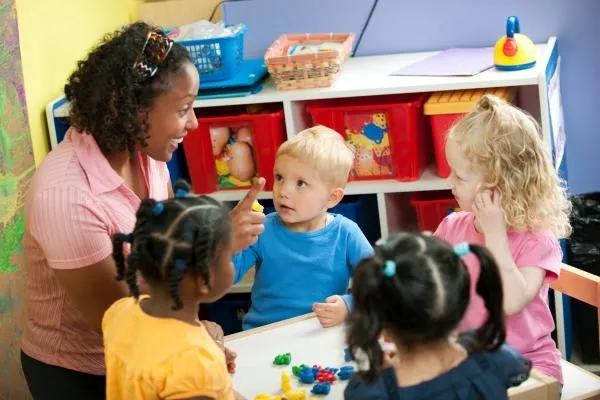
Signs of a Good Daycare
Signs of a Good Daycare

When choosing the right daycare, it can feel like a daunting task. There’s so much to consider, from safety to caregiver qualifications. The decisions you make affect both your child's development and your peace of mind. Below are some key signs to look for when evaluating daycare centers to ensure you're making the best choice for your child’s well-being.
1. Licensed and Accredited
One of the first things to check is whether the daycare is licensed by the state. Licensing ensures that the facility meets basic health, safety, and caregiving standards. Accreditation is an additional marker of quality, indicating that the daycare has voluntarily met higher standards, such as those set by the National Association for the Education of Young Children (NAEYC).
2. Positive Reviews
Read reviews from other parents. Trusted sources like local Facebook parent groups, Google reviews, and platforms like Care.com or Winnie can give you an idea of what to expect. Look for consistent praise in areas like staff quality, cleanliness, and communication.
3. Clean and Safe Environment
Safety is paramount. Look for childproof spaces, secure exits, and clear emergency procedures. Toys and play areas should be clean and well-maintained. Ask about the cleaning schedule and how frequently toys and surfaces are sanitized. Additionally, check if they adhere to food safety practices.
4. Engaged and Qualified Caregivers
Caregivers should be certified in CPR and first aid, and ideally have qualifications in early childhood education. More than that, they should show genuine care, interact at the child’s level, and foster a nurturing environment. A low caregiver-to-child ratio is also essential for providing individualized attention.
5. Structured and Age-Appropriate Curriculum
A good daycare will provide a stimulating, age-appropriate curriculum that supports the social, emotional, and cognitive development of your child. Whether it’s a play-based or Montessori approach, the daycare should foster curiosity and learning through structured activities. Explore More About Our Programs and Services!
6. Clear Communication with Parents
Good daycares provide regular updates about your child's day, behavior, and milestones. Whether it’s through a daily report, photos, or apps that track meals, naps, and activities, staying informed about your child’s well-being is crucial.
7. Low Child-to-Caregiver Ratio

The fewer children each caregiver is responsible for, the better attention your child will receive. An ideal ratio for infants is 1:4, for toddlers 1:6, and for preschoolers 1:8. These ratios help ensure that your child’s individual needs are met, whether they need comfort or extra attention.
8. Consistency and Low Turnover
High turnover among daycare staff can be unsettling for children, especially younger ones who thrive on consistency. Ask about the daycare’s employee retention rates. Happy and well-trained caregivers are less likely to leave, providing stability and emotional security for your child.
9. Diverse Activities

Children should be exposed to a variety of activities that promote creativity, learning, and physical development. From art projects to outdoor play, a good daycare will have a well-rounded daily schedule that allows children to explore new interests.
Explore More About Our Programs and Services
10. Safe and Stimulating Play Areas
Outdoor play is critical for a child's physical health. Make sure the daycare has a safe, enclosed outdoor area with age-appropriate play equipment. Inside, there should be distinct areas for active play, quiet time, and learning activities.
11. Clear Policies
A good daycare will have a clear set of policies regarding hours of operation, sick child policies, and emergency procedures. These should be clearly communicated to parents, along with any guidelines for parent visits and involvement.
12. Healthy Meals and Snacks
Daycares that provide meals should adhere to nutritional guidelines, offering balanced meals and snacks. Ask about their approach to dietary restrictions or allergies. If meals aren’t provided, inquire about what food you’re allowed to send and whether the daycare has any restrictions.
13. Child Development Monitoring
A good daycare will track your child’s progress in areas like social interaction, motor skills, and language development. Ask how they monitor your child’s milestones and how often they discuss progress with parents.
14. Positive Atmosphere
Lastly, you should feel a positive energy when you visit the daycare. Happy children, attentive caregivers, and a general sense of calm are all good signs. You should be able to picture your child enjoying their time there.
15. Transparent Pricing
Make sure you have a clear understanding of the pricing structure, including any additional fees for meals, activities, or extended care. Knowing exactly what’s included in the tuition will help you avoid unexpected costs later on.
Conclusion
Choosing the right daycare takes time and careful consideration. By asking the right questions and looking for these essential signs, you can find a daycare that not only provides excellent care but also offers a nurturing, stimulating environment where your child can thrive.
Be sure to visit the daycare, ask about their staff qualifications, check their safety measures, and see how they handle communication. Your child’s well-being is the priority, and with a little research, you’ll find the perfect place.